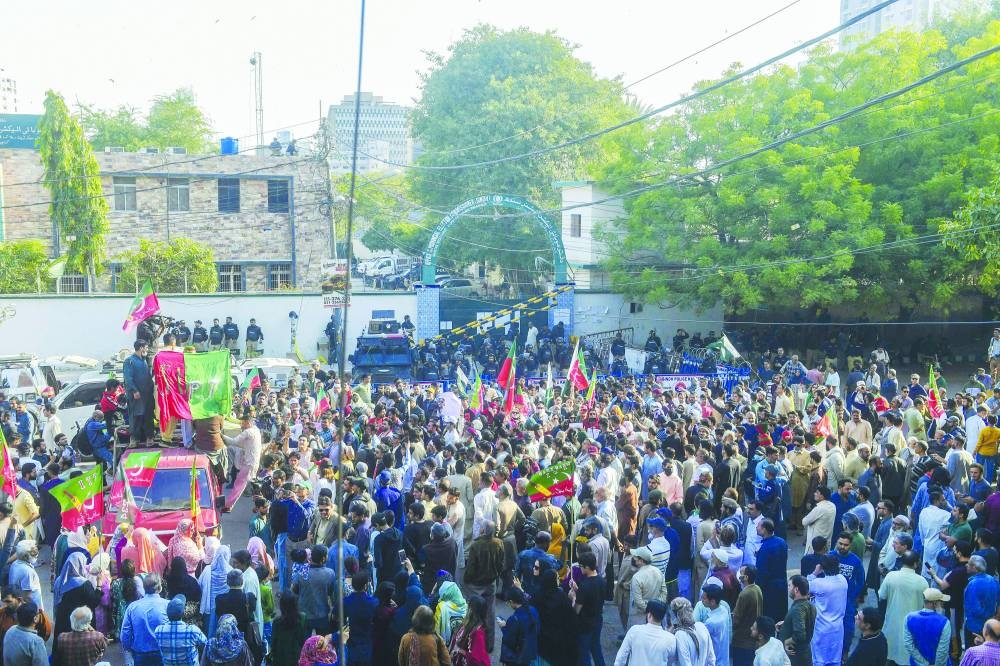The final results of Pakistan’s national election put independents, backed by jailed former prime minister Imran Khan, in the lead with 93 of 264 seats.
The party of another former prime minister, Nawaz Sharif, was second with 75 seats after Thursday’s vote, lacking a clear majority but it was the largest single party in parliament as Khan’s independents ran as individuals.
As coalition talks were held and protesters blocked roads in the north of the country, it was not clear who would form a government. The final tally of votes was published by the Election Commission more than 60 hours after voting ended, raising questions over the delay.
The former prime ministers and bitter rivals have both declared victory, adding to the uncertainty as the country faces numerous urgent challenges, including negotiating a new International Monetary Fund programme to keep a struggling economy afloat.
A prime ministerial candidate has to show a simple majority of 169 seats in the National Assembly when the house is called in the coming days. This will be determined by coalition talks and whether Khan-backed candidates are able to join a smaller party in parliament to form a single bloc to gain reserve seats.
Khan’s PTI party had threatened to hold nationwide peaceful demonstrations yesterday if the vote tally was not released overnight.
Pakistan’s interim government said the voting count delay was caused by communications issues due to a mobile Internet outage on Election Day. The outage, which authorities said was for security reasons, drew concern from human rights groups and foreign governments, including the United States.
Around 93 of the independent candidates who won seats were associated with Khan’s PTI party.
Khan’s supporters ran as independents because they were barred by the Election Commission on technical grounds from contesting the polls under his party’s electoral symbol.
Despite the ban and Khan’s imprisonment for disputed convictions on charges ranging from leaking state secrets to corruption, millions of the former cricket superstar’s supporters came out to vote for him, even though he cannot be part of any government while he remains in prison.
One disadvantage the independents face in trying to form a government is that they, having not run as a party, are not eligible to be allocated any of parliament’s 70 reserved seats, which are distributed according to party strength in the final tally. Sharif’s party could get up to 20 of these seats.
A spokeswoman for Sharif’s party said that he had met with representatives of the minority regional Muttahida Qaumi Movement (MQM) party and they had agreed to “in principle work jointly in the larger interest of the country.”
An MQM leader confirmed the meeting but said no formal coalition agreement had been made.
The Election Commission previously flagged that results for two seats could not yet be included, one in which a candidate was killed, requiring the postponement of polling, and another in which polling would be completed later this month.
“The results have clearly indicated that no single party possesses a simple majority to establish a government,” said Zahid Hussain, a political analyst and author.
“The political future of the country from this point onward is highly uncertain.”
Still, PTI leaders insist they have been given a “people’s mandate” to form the next government.
“The people have decided in favour of Imran Khan,” party chairman Gohar Ali Khan told Arab News in an interview.
A coalition between the PML-N and the PPP — who formed the last government after ousting Imran Khan with a no-confidence vote in April 2022 — still seems the most likely outcome.
The military looms large over Pakistan’s political landscape, with generals having run the country for nearly half its history since partition from India in 1947.
The military-backed PML-N, founded by three-time prime minister Sharif, declared victory as the party with the largest number of seats, but to form a government he will be forced to cut deals with rivals and independents.
Meanwhile, police fired tear gas to disperse supporters of Imran Khan yesterday after his party urged protests outside election offices where they said rigging had taken place in last week’s national vote.
Clashes were reported in Rawalpindi city, south of the capital, and Lahore, in the east, while dozens of other protests were held across the country without incident.
Police warned earlier they would come down hard on “illegal” gatherings. There were no immediate reports of injuries from the protests.
“Throughout Pakistan, elections were manipulated in a subtle way,” PTI chairman Gohar Ali Khan told a news conference Saturday, calling on supporters to “protest peacefully” yesterday.
Authorities warned they would take strict action, saying so-called Section 144 orders were in place — a colonial-era law banning public gatherings.
“Some individuals are inciting illegal gatherings around the Election Commission and other government offices,” a statement from Islamabad’s police force said yesterday.
“Legal action will be taken against unlawful assemblies. It should be noted that soliciting for gatherings is also a crime,” it said.
A similar warning was also issued in Rawalpindi, while dozens of police equipped with riot gear assembled near Liberty Market in Lahore.
In Rawalpindi, AFP staff saw police fire tear gas at a crowd of dozens of PTI supporters after they refused orders to stop picketing an office used to collect constituency election results.
Another gathering of around 200 PTI supporters in Lahore dispersed quickly when police moved in with riot shields and batons.
Local media said several people were detained in Karachi, in the south, when they refused orders to clear the area.

Supporters of Khan’s Pakistan Tehreek-e-Insaf party protest against the alleged skewing in Pakistan’s national election results, in Karachi yesterday. (AFP)
